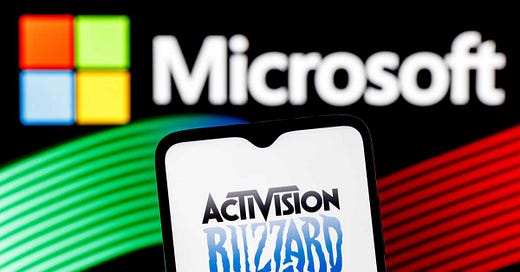If you like today’s post, please like and share. I run a combination of a free and paid notebook that highlights my notes, thoughts, opinions, and trade ideas.
You can do so by subscribing via the link below and selecting which “tier” you would like to be a part of.
Hello everyone, thanks for making it back to part II of my two-part notes on the Microsoft MSFT 0.00%↑ and Activision ATVI 0.00%↑ deal. If you missed part I, you can find it below.
In part II, I’m going to be sharing my updated thoughts on the issues with the deal going through, the probability of the deal happening, the trade structure that I’m personally thinking of, and then what happens if the deal falls through.
So with that, let’s take a look at the current deal probability that the market believes.
As of right now, the deal's probability of closing is at ~68%. Given that the expected probability has dropped to just under 20% in November, there have been quite a few changes that have occurred since then.
But what’s the main theme of why the FTC wants to block this merger is because of one thing. Competition.
The Federal Trade Commission is seeking to block technology giant Microsoft Corp. from acquiring leading video game developer Activision Blizzard, Inc. and its blockbuster gaming franchises such as Call of Duty, alleging that the $69 billion deal, Microsoft’s largest ever and the largest ever in the video gaming industry, would enable Microsoft to suppress competitors to its Xbox gaming consoles and its rapidly growing subscription content and cloud-gaming business.
It’s always been about competition since Microsoft owns Xbox, one of the gaming consoles that compete against Sony’s PS5, Nintendo’s Switch, etc.
The FTC’s complaint1 believes that Microsoft will take Activisions' slew of games (Overwatch, Diablo, Call of Duty, World of Warcraft, etc) and leverage its power against its rivals to either withhold them against its competitors or to squeeze them for a better deal.
A squeeze in my mind that resembles how Apple’s ecosystem is so airtight that it charges a 30% take rate on payments made through the app.
But the FTC’s claims I feel are personally bullshit because a lot of the games that you see above heavily rely on their ability to appeal to the masses. Without the reach that they currently have, their sales would be a fraction of what they currently are.
The theme here? You can’t bite the hand that feeds you.
So let’s talk about the issues at hand with this deal.
Microsoft could release exclusive only titles + have a monopoly
With Microsoft having already acquired Bethesda in 2021 for $7.5 billion, the scope for Xbox to push consumers to Xbox Series X|S for Bethesda titles already exists. If you want to play the AAA Bethesda title Starfield you have to own an Xbox Series X|S.
Xbox could use Activision/Blizzard exclusivity to monopolize some of gaming's most popular franchises, forcing you to own an Xbox Series X|S as competitors may not be able to sell specific Activision/Blizzard titles.
However, Xbox already releases most of its exclusive games on both PC and Xbox, so the idea that the deal would make Activision/Blizzard titles solely available on Xbox Series X|S is unlikely to be true.
But this notion of having exclusive titles isn’t anything new. In fact, PlayStation is a culprit itself, for instance, PlayStation acquired Bungie for $3.7 billion2 in 2022 and added PlayStation-exclusive content to Destiny 2 as an example.
What’s funny is that Brad Smith, President of Microsoft, said back in December that just shows how unbalanced the exclusivity currently is.
“PlayStation has 286 exclusive games, compared with Xbox’s 59, so the administrative law judge is going to have to decide whether going from 59 to 60 is such a danger to competition that he should stop this from moving forward.”3
He even goes on to add that
“If you look at the global market, Sony has 70% of that market, and we have 30%. So the first thing a judge is going to have to decide is whether the FTC lawsuit is a case that will promote competition or is it really instead of case that will protect the largest competitor from competition.”
So while exclusivity may worry you, the deal may look to avoid restricting gamers and, even if Xbox were to make specific games exclusive, follows current trends within the gaming industry.















